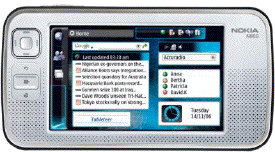
|
|||||||||||||||||||||||||||||||||||||||||||||||||||||||||||||
|
Next Apple toy isn't even from Apple!
Yup, my next iPod/iPhone-alike thingy isn't even from Apple and it runs Linux, and comes highly recommended by geeks everywhere. I just put in the order on Amazon, I'll let you know how cool it is in a few days.
PS: This is my way of thanking Ben Bernanke for the huge windfall I got in the stock market yesterday and today. I think the 1/2 percent drop in interest rates is supposed to make us go out and buy stuff to stimulate the economy. Just doing my part Uncle Ben! Paul Krugman has a weblog. Subscribed. CyberSalon in Berkeley, September 23, "Politics 101 Meets Web 2.0: Democracy or Demagoguery?" 4 to 6PM, Hillside Club, $15 at door for food, drink, and open mike discussion for digital and analog political activists. Political candidates of all stripes now have web sites, participate in social networks, and can respond to folks via YouTube. So are we closer to democracy? Marc Canter wrote an open letter to Mark Zuckerberg. OPML 2.0 freezes on Thanksgiving Day (U.S.) Mark your calendar: November 22. That's the day, barring something unforseen, that OPML 2.0 will move from a draft to a final frozen spec. If you plan to use OPML 2.0, or you're already using it, please set aside a few hours to carefully review the spec, between now and the end of September, or at the latest early October, to be sure it makes sense to you. We're doing this very slowly and carefully so people will believe in the quality of this spec. If you don't think it's a good spec, now is the time to say why. Speak now or forever hold your peace. You may not like the format, that's not the issue now -- it's the spec we're trying to finalize. Thanks for your help!
As Jim Forbes points out, if you wait for hotels to change, you're going to wait a long time. They're not really in the conference business, they're in the bedroom business. So anything that keeps people out of the hotel is likely to stay out of the conference -- like really terrific networking. So that suggests a different approach, one that does not rely on hotels. I've done four conferences, three of them at universities, and one at CNET in San Francisco. At two of them, we hosted as many people as they did at TC40, because we had multiple tracks, and a very large facility. And the last three were all very much present on the net. The first, not so much. If I do another conference, we'd try to push the envelope on the net side of things, and probably not try to host as many people in person. Instead of 500 to 1000 people, I'd try for 50 to 100 people. Kind of a middle-ground between the experts at the TC40 conf, and the audience. More like a TV studio than a conference. Everyone would be either a blogger or reporter. All would be encouraged to participate. And everyone would lead a chat room, or a blog comment section, or a video track. We could have much more diverse video nowadays, because of services like justin.tv and ustream.tv, and I'm sure many others, who provide outbound bandwidth. All we'd need at the facility is enough bandwidth to connect to these services, and if you're not at a hotel, that's not at all hard these days. You could do it at Stanford or Cal, or even the Hillside Club. If you're not deep inside a building with thick walls, EVDO can serve as a backup. If you can't get on through the LAN, try a WAN instead. I'd also like to see less of a focus on the interests and success stories of venture capital. Something has really changed, even the VCs seem to know it. Money is undifferentiated, so why pay so much attention to what the money people say. Let's get people with big ideas to contribute them, and to disagree with other people with big ideas. That's not to say I'd exclude the money people. But I would insist that they be people who are participating in the networked conversation, not just at the show, but 24 by 7, on blogs, on Twitter, on whatever. I had this discussion with Loic last week. I didn't think and still don't think that it was a good idea for him to have French politicians speak at LeWeb last year. I didn't think it was a good idea for Chris to invite John Edwards to speak at Gnomedex in 2006. Why? Because these people don't have blogs, they don't understand the net. They want to use it, for sure, to get money and votes, but they don't have a vision for it, beyond that, so what they have to say is uninteresting. "Give me money. Vote for me." That's all they say. If they want to come, great, let them listen and ask questions. And look for politicos (as with the VCs) who are making a difference on the net. People like Fred Wilson or Paul Kedrosky, for example. I'm sure there are many more. And I'd work to develop more ways for the back-channel to participate, to come to the front. That's the key to the future of conferences, how to extend them into the net, so the communication path is every way imaginable, not just from the venue out to the world. I want to feel like I'm in a nerve center, whether I'm at the venue or sitting in my living room in Berkeley. I had that feeling, btw, or an inkling of it, watching the AlwaysOn conference eariler this year, which had excellent presence on the net, real-time. The TC40 conference promoters, amazingly, actively thwarted the back channel. I don't know what their thinking was, but I think it was wrong. Maybe someday these conferences could host real-time development, where media hackers put together new communication systems and deploy them before the conference is over. The moon mission approach to development, if you want to get something done quickly, make sure you know where you're going and are excited about it. Sometimes it's amazing how quickly these things can bootstrap. I'd also like to see a mix of interviews and debates, and open discussion. Dinners in every major city that wants to have them. The truly great tech conferences of the future will be world wide events, as the web itself is world wide, and will be inclusive, not exclusive, and cost very little to participate in, if not $0. Mundeemo: "Don't forget a row of suicide booths.." Doc Searls: "If you're a fast-growing tech company looking for the maximum quantity of high-quality local talent, there isn't much choice. Silicon Valley is the place." Adam Green, on the other hand, wants to bring the Boston Boomers back into the tech business. As predicted, Mint did win the top prize at the TC40 conf. Fred Wilson, an investor in Wasabe, one of several companies in the market that Mint is entering, thinks we should have a discussion about the security of financial data on the web. Just in time for my Long Bet with Martin Nisenholtz, the NY Times has opened their archive and eliminated TimesSelect. So now if they broke the top stories of 2007, they will show up in a Google search. If this means I lose the bet, so be it. The money goes to a charity, either way, and I'd rather have the Times content be open. |
Dave Winer, 52, pioneered the development of weblogs, syndication (RSS), podcasting, outlining, and web content management software; former contributing editor at Wired Magazine, research fellow at Harvard Law School, entrepreneur, and investor in web media companies. A native New Yorker, he received a Master's in Computer Science from the University of Wisconsin, a Bachelor's in Mathematics from Tulane University and currently lives in Berkeley, California. "The protoblogger." - NY Times.
"The father of modern-day content distribution." - PC World.
"Helped popularize blogging, podcasting and RSS." - Time.
"The father of blogging and RSS." - BBC.
"RSS was born in 1997 out of the confluence of Dave Winer's 'Really Simple Syndication' technology, used to push out blog updates, and Netscape's 'Rich Site Summary', which allowed users to create custom Netscape home pages with regularly updated data flows." - Tim O'Reilly.
My most recent trivia on Twitter. Comment on today's On This Day In: 2006 2005 2004 2003 2002 2001 2000 1999 1998 1997.
|
||||||||||||||||||||||||||||||||||||||||||||||||||||||||||||
|
© Copyright 1997-2007 Dave Winer. Previous / Next |
|||||||||||||||||||||||||||||||||||||||||||||||||||||||||||||
 Remember a couple of weeks ago
Remember a couple of weeks ago 

 The TC40 conference, which (important caveat) I did not attend, had a big impact on the space I occupy. Sometimes I think we put too much emphasis on Techmeme, but it is important, and for the two days of TC40, most of the top articles had something to do with the conference. Yet most of the people in the TechMeme loop were not there. This makes me wonder if we can do better with these conferences that become the cursor for a few days. And the answer is of course we can. But it may mean reconfiguring the conference to take the emphasis off the people in the room and put it on the people on the net.
The TC40 conference, which (important caveat) I did not attend, had a big impact on the space I occupy. Sometimes I think we put too much emphasis on Techmeme, but it is important, and for the two days of TC40, most of the top articles had something to do with the conference. Yet most of the people in the TechMeme loop were not there. This makes me wonder if we can do better with these conferences that become the cursor for a few days. And the answer is of course we can. But it may mean reconfiguring the conference to take the emphasis off the people in the room and put it on the people on the net.

